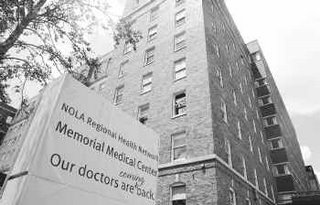 This might be a case of "dog bites man," but the Jacksonville Business Journal reports that area HCA hospitals have adopted the practice of screening emergency room patients (as required by EMTALA) and showing nonemergency patients the door (as permitted by EMTALA) with a brochure listing area clinics in their hands. Is this news, exactly? In my limited urban ER experience, you can sit in the waiting room on a Saturday or Sunday morning and watch one person after another get screened by a nurse who shows the BP/temp/pulse data to a doc and then gently but firmly escorts the almost-a-patient back out to the street. The more humane or enlightened institutions have an ambulatory care clinic to which the a-a-p can be directed, though most ACC's seem to be open only during regular business hours Mon.-Fri. Another common practice is to triage nonemergency ER patients to a non-acute treatment room within the emergency department. The brochure is a nice touch, though the article does quote someone who says the brochure has several inaccurate phone numbers and facility names.
This might be a case of "dog bites man," but the Jacksonville Business Journal reports that area HCA hospitals have adopted the practice of screening emergency room patients (as required by EMTALA) and showing nonemergency patients the door (as permitted by EMTALA) with a brochure listing area clinics in their hands. Is this news, exactly? In my limited urban ER experience, you can sit in the waiting room on a Saturday or Sunday morning and watch one person after another get screened by a nurse who shows the BP/temp/pulse data to a doc and then gently but firmly escorts the almost-a-patient back out to the street. The more humane or enlightened institutions have an ambulatory care clinic to which the a-a-p can be directed, though most ACC's seem to be open only during regular business hours Mon.-Fri. Another common practice is to triage nonemergency ER patients to a non-acute treatment room within the emergency department. The brochure is a nice touch, though the article does quote someone who says the brochure has several inaccurate phone numbers and facility names.
Health care law (including regulatory and compliance issues, public health law, medical ethics, and life sciences), with digressions into constitutional law, statutory interpretation, poetry, and other things that matter
Tuesday, August 15, 2006
ER sends nonemergency patients packing
 This might be a case of "dog bites man," but the Jacksonville Business Journal reports that area HCA hospitals have adopted the practice of screening emergency room patients (as required by EMTALA) and showing nonemergency patients the door (as permitted by EMTALA) with a brochure listing area clinics in their hands. Is this news, exactly? In my limited urban ER experience, you can sit in the waiting room on a Saturday or Sunday morning and watch one person after another get screened by a nurse who shows the BP/temp/pulse data to a doc and then gently but firmly escorts the almost-a-patient back out to the street. The more humane or enlightened institutions have an ambulatory care clinic to which the a-a-p can be directed, though most ACC's seem to be open only during regular business hours Mon.-Fri. Another common practice is to triage nonemergency ER patients to a non-acute treatment room within the emergency department. The brochure is a nice touch, though the article does quote someone who says the brochure has several inaccurate phone numbers and facility names.
This might be a case of "dog bites man," but the Jacksonville Business Journal reports that area HCA hospitals have adopted the practice of screening emergency room patients (as required by EMTALA) and showing nonemergency patients the door (as permitted by EMTALA) with a brochure listing area clinics in their hands. Is this news, exactly? In my limited urban ER experience, you can sit in the waiting room on a Saturday or Sunday morning and watch one person after another get screened by a nurse who shows the BP/temp/pulse data to a doc and then gently but firmly escorts the almost-a-patient back out to the street. The more humane or enlightened institutions have an ambulatory care clinic to which the a-a-p can be directed, though most ACC's seem to be open only during regular business hours Mon.-Fri. Another common practice is to triage nonemergency ER patients to a non-acute treatment room within the emergency department. The brochure is a nice touch, though the article does quote someone who says the brochure has several inaccurate phone numbers and facility names.
Sunday, August 13, 2006
Kaiser fined for mismanagement of its kidney-transplant program
 Considering how neurotic the organ-transplant industry is to maintain a squeaky-clean image, it's remarkable that Kaiser Permanente's been hit with a massive fine from California's Department of Managed Health Care [press release] for mismanaging its kidney-transplant program. Even more significant, for my money, is the lesson here.
Considering how neurotic the organ-transplant industry is to maintain a squeaky-clean image, it's remarkable that Kaiser Permanente's been hit with a massive fine from California's Department of Managed Health Care [press release] for mismanaging its kidney-transplant program. Even more significant, for my money, is the lesson here.How many times has a health care provider tried to minimize the imposition of civil penalties by characterizing its lapses as "mere" record-keeping or bureaucratic errors, insisting all the while that no patient was put at risk and quality care wasn't compromised? My take on such evasions is that paperwork snafu's are typically the tip of the iceberg or (to mix my metaphors) the regulator's low-hanging fruit. If a place can't keep the administrative details straight, you can bet there's more to the situation than misplaced files and incomplete reports. Kaiser's situation is a good example:
Kaiser suspended its Northern California kidney transplant program in May amid mounting regulatory pressure and patient lawsuits alleging that botched paperwork and administrative errors had imperiled lives.
Problems arose when Kaiser ordered Northern California kidney patients to transfer from University of California hospitals to its new transplant center in 2004.
Kaiser failed to discuss with regulators the transfer of up to 1,500 patients to the new center, delaying some patients' procedures, the Los Angeles Times reported. Only 56 transplants were performed at the Kaiser's San Francisco center in 2005, while twice that number of people died waiting for a kidney, the Times reported.
At other California transplant centers, more than twice as many people received kidneys than died.
Lucinda Ehnes, director of the managed care department, said Kaiser's administrative oversight was inadequate and it provided too few personnel to accomplish the transfers.
The company also failed to provide timely access to specialists and did not properly respond to patient complaints, she said.
Mary Ann Thode, president of Kaiser Foundation Health Plan and Hospitals in the Northern California region, said the HMO deeply regretted "any problems, difficulties or concerns we may have caused any of our patients as a result of their experience."
"Problems," "difficulties," and "concerns" are corporate euphemisms for the likely loss of lives of patients who placed their faith in Kaiser. But give Kaiser credit: it isn't engaging in the usual evasions about "mere errors in the paperwork," but is instead taking responsibility and vowing to do better in the future.
Costly Drugs Force Life-Death Decisions
 From the AP, a good story about the costly, high-tech armamentorium of drugs and devices that offer the promise of extending life-spans once deemed to be "terminal," but at a price that's so high, some patients simply opt out:
From the AP, a good story about the costly, high-tech armamentorium of drugs and devices that offer the promise of extending life-spans once deemed to be "terminal," but at a price that's so high, some patients simply opt out:More patients are confronting this wrenching decision, as the latest generation of pricier cancer drugs and heart implants stretches out the final months of advanced disease. Is the chance for several more months of life - maybe a year or more with luck - precious enough to spend a small fortune? This dilemma is also challenging governments, employers and insurers, who all help finance America's longer life spans and innovative technologies.
Extraordinary care for dying patients can make for inspiring medicine, but its extraordinary costs make it an increasingly debated choice to promote public health. Many economists, doctors, and ethicists say this care too often buys too little for too much - and that its expanding share of medical resources might better pay for screening and treating diseases in earlier stages.
Already, up to 30 percent of annual payments by federal Medicare insurance go to the 5 percent of members in their last year of life, research shows.
"People still have an underlying belief that there's an infinite amount of resources that can be invested in health care," says Dr. Harlan Krumholz, a Yale University heart specialist who studies quality of care. "But I think we're coming to a realization that we're going to need to confront these issues explicitly."
Maybe so, but any retreat from last-resort care still raises objections from many patients, doctors and medical companies. They denounce "rationing" of care and defend expensive treatments for the dying as a moral imperative.
More on non-heart-beating organ donors
 "NHBD" is slowly being replaced by "DCD" ("donation after cardiac death"), but whatever name it goes by, these organ-donor protocols continue to get (deservedly) close scrutiny, most recently in the New Scientist. The move away from brain death and toward cardiopulmonary death is, contrary to the implications of this article, not evidence of a "new" standard for determining when death occurs, but rather is a return to the old way of determining death. Most states retained cardiopulmonary death when they adopted brain death, so no change in law is needed except in the few states that made neurological criteria the sole standard for determining when death occurs. The real concerns -- and this is brought out in the article -- are over whether the existing protocols run roughshod over the the requirement that the absence of cardiac and pulmonary function be irreversible and whether the administration of regitine and heparin cause the cessation of cardiopulmonary function. For more on all this, a good place to start is the 1997 IOM report, "Non-Heart-Beating Organ Transplantation: Medical and Ethical Issues in Procurement."
"NHBD" is slowly being replaced by "DCD" ("donation after cardiac death"), but whatever name it goes by, these organ-donor protocols continue to get (deservedly) close scrutiny, most recently in the New Scientist. The move away from brain death and toward cardiopulmonary death is, contrary to the implications of this article, not evidence of a "new" standard for determining when death occurs, but rather is a return to the old way of determining death. Most states retained cardiopulmonary death when they adopted brain death, so no change in law is needed except in the few states that made neurological criteria the sole standard for determining when death occurs. The real concerns -- and this is brought out in the article -- are over whether the existing protocols run roughshod over the the requirement that the absence of cardiac and pulmonary function be irreversible and whether the administration of regitine and heparin cause the cessation of cardiopulmonary function. For more on all this, a good place to start is the 1997 IOM report, "Non-Heart-Beating Organ Transplantation: Medical and Ethical Issues in Procurement."
Latest from AHLA's Health Lawyers Weekly (11 Aug 2006)
 With the permission of the American Health Lawyers Association, here's this week's Table of Contents for its Health Lawyers Weekly (free member benefit):
With the permission of the American Health Lawyers Association, here's this week's Table of Contents for its Health Lawyers Weekly (free member benefit):Top Stories
- CMS Projects 5.1% Reduction In Medicare Physician Payment Rates For 2007: The Centers for Medicare and Medicaid Services (CMS) is projecting a negative 5.1% update in the Medicare physician fee schedule for 2007 under the Sustainable Growth Rate (SGR) formula, according to a proposed rule released August 8.Under the proposal, CMS expects payments of roughly $61.5 billion to 875,000 physicians and other healthcare professionals in 2007. Full Story
- CMS Issues Proposed OPPS Rule Containing Significant Revisions To ASC Payment: Hospitals will receive an overall average increase in Medicare payments of 3% in calendar year (CY) 2007 for outpatient services under the proposed hospital outpatient prospective payment system (OPPS) rule issued August 8 by the Centers for Medicare and Medicaid Services (CMS). Full Story
Articles & Analyses
- New IRS Independent Contractor Test, By Sidney S. Welch and Tizgel K. S. Mark, Powell Goldstein LLP
- 2005-2006 Physician Organizations Year In Review, Compiled by Health Lawyers' Physician Organizations Practice Group
- 2005-2006 Regulation, Accreditation, And Payment Year In ReviewCompiled by Health Lawyers' Regulation, Accreditation, And Payment Practice Group
Current Topics
- Antitrust
U.S. Court In Missouri Says Medical Group's Antitrust Suit Against Hospital Failed To Allege Relevant Geographic Market- EMTALA
U.S. Court In Missouri Dismisses EMTALA Claim, Finding No Evidence That Uninsured Patient Was Treated Differently- Food and Drug Law
GlaxoSmithKline Agrees To Pay $70 Million To Settle AWP Dispute- Fraud and Abuse
1. U.S. Court In Nevada Finds No Fact Issue Regarding Whether Government Knew Of FCA Defendant's Billing Practices
2. U.S. Court In Nevada Finds Government Failed To Establish FCA Claims Alleging Physician Improperly Billed Medicare For Tests- Health Policy
Tommy Thompson Issues Paper Urging Medicaid Program Reform- Hospitals and Health Systems
1. Uninsured Settle Pricing Lawsuit With Sutter Health
2. CMS Issues Final Report Outlining Its Strategic Plan For Specialty Hospitals- Long Term Care
1. Sixth Circuit Affirms Civil Money Penalty Imposed On Nursing Home
2. Nursing Home Care Continues To Fall Short, New Report Finds- Managed Care
1. U.S. Court In Maryland Grants Class Certification For Lawsuit Against HMO For Collecting Subrogation Claims
2. U.S. Court In Michigan Finds HMO Had Rational Basis For Denying Out-Of-Network Provider's Reimbursement Claim
3. Kaiser Agrees To Pay $5 Million For Lack Of Oversight Of Transplant Facility- Medicaid
Group Dismisses Lawsuit Seeking To Enjoin D.C. From Enforcing Medicaid
Proof-Of-Citizenship Requirements- Medical Malpractice
New Jersey Supreme Court Says Psychiatrist Can Be Liable For Abandonment Even Absent Duty To Warn- News in Brief
FDA Seeks Comments On UDI System For Medical Devices- Physicians
U.S. Court Of Federal Claims Dismisses Physician's Action Against U.S. Stemming From Loss Of Medical Licenses(c) 2006. Reprinted by permission of AHLA. All rights reserved.
Lawsuit Seeking to Discipline Georgia Physicians for Participation in Executions Dismissed
 From the Federation of State Medical Boards:
From the Federation of State Medical Boards:A lawsuit seeking to require the Georgia Composite State Board of Medical Examiners to punish physicians who participate in executions was dismissed last week by a Fulton County Superior Court judge. Lawyers for seven physicians, including three physicians in Georgia, had sought to have the medical board uphold American Medical Association guidelines that prohibit physicians from involvement in executions.
Lawyers for the state argued that the physicians had no legal standing to sue because they could show no specific harm, and that state law is the determining factor in the administration of lethal injection in Georgia, not the AMA’s ethical guidelines. Complaints were filed with the medical board against a Georgia physician who assisted the department of corrections with executions, but the board declined to discipline him. The lawsuit, filed by a group of Atlanta-area lawyers, unsuccessfully sought to appeal the board’s decision.
In April, Georgia Gov. Sonny Perdue signed a bill (HB 57 [link]) that protects any physician licensed in Georgia from having their license challenged, revoked or suspended if the individual participates, in any way, in the state’s execution process. The Act became effective July 1, 2006, and applies to executions carried out on or after July 1, 2006.
Should prisoners be enrolled in riskier drug studies?
 The New York Times has an interesting article on this question, spurred by a recent report of the Institute of Medicine that recommends altering the "minimal risk" standard that now applies to prisoners as long as the greater risks are accompanied by the potential of some benefit to the prisoners themselves. The IOM's press release on the report and recommendations is here.
The New York Times has an interesting article on this question, spurred by a recent report of the Institute of Medicine that recommends altering the "minimal risk" standard that now applies to prisoners as long as the greater risks are accompanied by the potential of some benefit to the prisoners themselves. The IOM's press release on the report and recommendations is here.
Thursday, August 10, 2006
AHLA Health Lawyers Weekly (04 Aug 2006)

With the permission of the AHLA, here's the TOC for last week's HLW [members only] (which came in while I was on vacation); this week's TOC should be available tomorrow.
- Top Stories
- CMS Issues Final IPPS Rule That Phases-In Move To Cost-Based System
The Centers for Medicare and Medicaid Services (CMS) issued August 1 the
much-anticipated inpatient prospective payment system (IPPS) final rule for
fiscal year (FY) 2007 that seeks to improve the accuracy of hospital payments by moving from a charge to cost-based system and by accounting more fully for patient severity. - CMS, OIG Release Final Health IT Rules
The Centers for Medicare and Medicaid Services (CMS) and the Department of Health and Human Services (DHHS) Office of Inspector General (OIG) released final rules August 1 to speed the adoption of electronic prescribing and electronic health records. - Articles & Analyses
- OIG Publishes Report Of Claims Billed By Independent Diagnostic Testing
Facilities
By Marla P. Spindel, Powers, Pyles, Sutter & Verville, P.C. - 2005-2006 Long Term Care Year In Review
Compiled by Health Lawyers' Long
Term Care Practice Group - 2005-2006 Medical Staff, Credentialing, and Peer Review Year In
Review
Compiled by Health Lawyers' Medical Staff, Credentialing, and Peer
Review Practice Group - Current Topics
- Corporate Governance
- GAO Releases Survey Results Of Nonprofit
Hospitals' Executive Compensation Practices
- GAO Releases Survey Results Of Nonprofit
- ERISA
- Eleventh Circuit Upholds Dismissal Of State Law Claims Against Insurer Of ERISA-Governed Health Plan That Failed To Disclose Lapsed Plan
- Food and Drug Law
- FDA Announces Plans For OTC Marketing Of Plan B
- Enzi, Kennedy Introduce Drug Safety Bill
- Fraud and Abuse
- First Circuit Vacates Three-Month Prison Sentence For Executive Convicted Of Conspiring To Defraud Medicare Of Over $5 Million
- Update
- Health Information Technology
- DHHS Recognizes CCHIT Criteria For EHRs, Releases Certification Guidance Document
- Hospitals and Health Systems
- Grassley, Baucus Question Whether CMS' Specialty Hospital Study Is Flawed
- HSC Study Discusses Implications Of Growth In ASCs And Rising Specialty-Service Competition
- Managed Care
- Florida Appeals Court Overturns Dismissal Of Hospital's Action Seeking Reimbursement For Emergency Services Rendered To HMO Subscriber
- Medical Records
- California Appeals Court Finds Health Plan May Disclose To Its Attorney Medical Records Of Potential Malpractice Complainants
- Medicare
- GAO Sees Promise In CMS' New Cost-Based Approach Under IPPS
- CMS Announces First Contract For Payment Of Medicare Part A And B Claims
- Grassley, Baucus Introduce Bill To Improve Accuracy Of Medicare Payments To Hospitals
- OIG Finds Medicare Part B Drug Costs Would Have Been Cut By $16 Million Had CMS Applied Authorized Price Adjustment
- CMS Issues Final Rule Updating Payment Rates For IRFs In FY 2007
- CMS Issues Final Rule On Accreditation Of DME Suppliers
- CBO Researcher Says Medicare Spending Per Beneficiary Has Slowed In Recent Years
- OIG Releases Reports On Medicare Beneficiary Access To Home Health Agencies And Skilled Nursing Facilities
- Report Says Medicare Beneficiaries With HIV/AIDS Face High Out-Of-Pocket Costs Under Part D
- News in Brief
- JCAHO Will Test Measures For Inpatient Psychiatric Services
- NCQA Adds Two New Standards To Its 2007 Accreditation Standards For Managed Care Plans
- Physicians
- New York Court Finds Physician Not Required To Exhaust Administrative Remedies To Sue For Contract Breach
- Quality of Care
- Report Makes Recommendations For Improvement Of Current Flawed Healthcare System
Tuesday, August 08, 2006
FDA, Barr Pharmaceuticals, reach accord over Plan B contraceptive sales
 In Wednesday's paper, the NY Times reports that the FDA and the manufacturer of the Plan B contraceptive have reached an agreement that may lead to OTC sales (at least to customers 18 years of age and up; under-18's will still need a prescription) within weeks. The story doesn't refer to an earlier report that the FDA offered the deal to Barr last week, on the eve of hearings on the nomination of acting Commissioner Andrew C. von Eschenbach, apparently in response to the announced opposition of Sen. Hillary Clinton and other Senate Dems, who had vowed to delay a vote on the nomination until the FDA cleared its apparently unprecedented derailing of the OTC application. Pro-life groups regard the drug as an abortifacient, despite FDA's official classification of Barr's Plan B drug as an emergency contraceptive, so we can expect this latest development to produce the usual ripple effect of abortion politics.
In Wednesday's paper, the NY Times reports that the FDA and the manufacturer of the Plan B contraceptive have reached an agreement that may lead to OTC sales (at least to customers 18 years of age and up; under-18's will still need a prescription) within weeks. The story doesn't refer to an earlier report that the FDA offered the deal to Barr last week, on the eve of hearings on the nomination of acting Commissioner Andrew C. von Eschenbach, apparently in response to the announced opposition of Sen. Hillary Clinton and other Senate Dems, who had vowed to delay a vote on the nomination until the FDA cleared its apparently unprecedented derailing of the OTC application. Pro-life groups regard the drug as an abortifacient, despite FDA's official classification of Barr's Plan B drug as an emergency contraceptive, so we can expect this latest development to produce the usual ripple effect of abortion politics.
Thursday, August 03, 2006
NH's medical board agrees: doc has 1st Amendment right to be a jerk
 As reported here earlier, a local NH court ruled that Terry Bennett's rude and crude comments to his patients were protected by the First Amendment and couldn't be the basis of a disciplinary case against the doctor. Apparently the New Hampshire State Board of Medicine agrees. As reported by Modern Healthcare today, the Board
As reported here earlier, a local NH court ruled that Terry Bennett's rude and crude comments to his patients were protected by the First Amendment and couldn't be the basis of a disciplinary case against the doctor. Apparently the New Hampshire State Board of Medicine agrees. As reported by Modern Healthcare today, the BoardThis has to be the right result, from a constitutional perspective. Too bad it will probably only encourage the good doctor in his boorish and racist comments. The AP story is here (courtesy of the Boston Globe).will not appeal a court decision that blocked a disciplinary case over comments made by Rochester, N.H., physician Terry Bennett to patients in his private practice. The board sought to determine whether Bennett's comments, which at least three patients characterized as offensive, breached professional ethics standards.
Friday, July 28, 2006
AHLA's Health Lawyers Weekly
 With AHLA's permission, here's the Table of Contents of today's issue of Health Lawyers Weekly:
With AHLA's permission, here's the Table of Contents of today's issue of Health Lawyers Weekly:I. Top Stories:
- House Clears HIT Legislation
- FDA To Improve Transparency Of Advisory Panel Conflicts, Official Says
II. Articles & Analyses:
- A Discussion About Alternative Dispute Resolution In The Healthcare Field
- 2005-2006 In-House Counsel Year In Review
- 2005-2006 Labor And Employment Year In Review
III. Current Topics:
A. Criminal Law
- Seventh Circuit Says Dentist May Not Withdraw Guilty Plea To Medicaid Fraud
B. Employment and Labor
- New Jersey Supreme Court Says Shareholder-Director Of Radiology Practice Not An "Employee" Under State's Whistleblower Protection Statute
C. ERISA
- U.S. Court In Pennsylvania Says ERISA Pre-Empts Hospital’s Contract Claims Against Insurers
D. Fraud and Abuse
- Update
E. Health Information Technology
- CDC Finds Increasing Percentage Of Office-Based Physicians Using Electronic Medical Records
F. Hospitals and Health Systems
- Oregon Health System Settles Charity Care Lawsuit
- U.S. Court In New Jersey Rejects Lawsuit Against Health System For Overcharging Uninsured
- Labor Union Ordered To Pay $17.3 Million For Defaming Hospital System
- Long Term Care OIG Finds State Survey Agencies Failed To Investigate Serious Complaints At Nursing Homes Within Required Timeframes
G. Managed Care
- California Governor Issues Executive Order To End "Balance Billing"
- Medicaid Sixth Circuit Upholds Dismissal Of Most § 1983 Claims Against Michigan Officials For Failure To Provide Services Mandated By Medicaid Act
- States To Receive $1.75 Billion To Offer Alternative Long Term Care Options Under Medicaid
- CMS Announces New Policies For Medicaid Asset Transfers, Improved Coordination Of Care
- CMS OKs Landmark Massachusetts Healthcare Reform Plan
H. Medical Malpractice
- Texas Appeals Court Finds Error In Dismissal Of Malpractice Action Against Laboratory
I. Medicare
- House Panel Considers Medicare Physician Payment Fixes
- GAO Finds Few Major Access Problems Reported By Medicare Beneficiaries For Physician Services
- CMS Announces Payment Updates For Home Health Services, Nursing Homes
J. News in Brief
- CMS Announces $150 Million In Transformation Grants For State Medicaid Programs
- CMS Issues Final Part D Marketing Guidelines
- CMS Awards Contracts To Test Transfer Of Medicare Data To PHRs For Online Use
K. Physicians
- California Appeals Court Rejects Physician's Retaliatory Eviction And Suspension Claims Against Hospital
- California Supreme Court Holds Hospital Could File Anti-SLAPP Motion To Strike Complaint Arising From Peer Review Proceedings
Thursday, July 27, 2006
Vacation: what a concept!
Wednesday, July 26, 2006
NOLA murder arrests: further reflections
 Today's CDC Public Health Law Newsletter has a link to a Chicago Tribune article that explores the ethics of triage and its applicability vel non to the NOLA cases previously discussed (here, here, and here):
Today's CDC Public Health Law Newsletter has a link to a Chicago Tribune article that explores the ethics of triage and its applicability vel non to the NOLA cases previously discussed (here, here, and here):“Disaster plan: Time to think unthinkable?”
Chicago Tribune (07/19/06) Ronald Kotulak
Last week, two nurses and a doctor were arrested in New Orleans on charges that they gave lethal doses of drugs to four hospital patients in the aftermath of Hurricane Katrina. The second-degree murder charges have led ethicists to begin debating what actions taken by medical personnel are permissible in similar situations, such as catastrophic weather events, deployments of weapons of mass destruction, or even widespread influenza epidemics. In such situations, medical care might be limited. “What do you do if you had no way to treat people and they were ill and there was no power and the ventilation had gone down and the machines that had kept them alive were failing? That is an astonishingly important ethical problem, given the realities we face with disaster planning,” said Laurie Zoloth, director of the Center for Bioethics, Science and Society at the Northwestern University Feinberg School of Medicine. Zoloth compared such scenarios to doctors triaging wounded soldiers on the battlefield. Dr. Mark Siegler of the University of Chicago’s MacLain Center for Medical Ethics said there is sometimes a fine line between giving a patient morphine for pain and a dose high enough to cause death. But Dr. Joshua Hauser, a palliative care expert, said doctors have specific guidelines to follow to avoid a morphine-related death. “There’s significant consensus in the medical community that giving a dose of morphine with the intent of ending someone’s life is unacceptable,” he said.
Further thoughts on the Senate abortion bill
 As previously noted, the Senate has passed a bill that would impose criminal penalties on anyone who helps a minor travel across state lines from a state that has a parental-notification or -consent law in order to obtain an abortion in a state that has no such restrictions. As the map on my post illustrates, 6 states have no restrictions on minors: Washington, Oregon, Vermont, New York, Massachusetts, and Hawai'i. The House previously passed a similar bill [H.R.748; roll call #144], and news reports today say the president has said he will sign a bill if the two houses of Congress can agree on language in conference [NY Times].
As previously noted, the Senate has passed a bill that would impose criminal penalties on anyone who helps a minor travel across state lines from a state that has a parental-notification or -consent law in order to obtain an abortion in a state that has no such restrictions. As the map on my post illustrates, 6 states have no restrictions on minors: Washington, Oregon, Vermont, New York, Massachusetts, and Hawai'i. The House previously passed a similar bill [H.R.748; roll call #144], and news reports today say the president has said he will sign a bill if the two houses of Congress can agree on language in conference [NY Times].Maybe my brain isn't firing on all 8 cylinders this morning. But -- quite apart from whether you think a restriction like this is good social policy -- when was the last time Congress criminalized two perfectly legal acts, one of which the Supreme Court has decided is Constitutionally protected as a "fundamental right"?
Tuesday, July 25, 2006
Senate passes prohibition on interstate travel for abortion
 The Washington Post has the story. The Senate has passed a a bill (S.403) "to prohibit taking minors across State lines in circumvention of laws requiring the involvement of parents in abortion decisions [preamble]," thus (according to The Post) handing a long-sought victory to the Bush administration and abortion opponents":
The Washington Post has the story. The Senate has passed a a bill (S.403) "to prohibit taking minors across State lines in circumvention of laws requiring the involvement of parents in abortion decisions [preamble]," thus (according to The Post) handing a long-sought victory to the Bush administration and abortion opponents":The Senate bill is here and the roll-call vote is here.The bill would help about three dozen states enforce laws that require minors to notify or obtain the consent of their parents before having an abortion. It would bar people -- including clergy members and grandparents -- from helping a girl cross state lines to avoid parental-involvement laws. Violations could result in a year in prison.
Most states have passed such laws, but courts
have invalidated at least nine of them, advocacy groups say. . . . The Senate voted 65 to 34 to approve the bill, which is similar to one the House has approved before, including last year.
Juvenile court orders teen to accept chemo, reversed by circuit court
 Starchild Abraham Cherrix has Hodgkin's disease, and when the disease returned after his initial round of chemo, he refused a second round, opting instead for "a sugar-free, organic diet and take herbal supplements under the supervision of a clinic in Mexico" [Washington Post]:
Starchild Abraham Cherrix has Hodgkin's disease, and when the disease returned after his initial round of chemo, he refused a second round, opting instead for "a sugar-free, organic diet and take herbal supplements under the supervision of a clinic in Mexico" [Washington Post]:A social worker asked a juvenile court judge to require the teen to continue conventional treatment, and the judge on Friday ordered Abraham to report to a hospital Tuesday. But Accomack County Circuit Court Judge Glen A. Tyler suspended the judge's order. . . . Tyler [also] agreed to a stay and set a trial date of Aug. 16 [and] ended joint custody of Abraham between his parents and social services officials.
In a similar case last year, the parents of 13-year-old Hodgkin's disease patient Katie Wernecke won the right in November to make all her medical decisions after a court fight with Texas child welfare officials. Doctors had recommended chemotherapy and radiation; her father favored a program of intravenous vitamin C.
The 'Net is ablaze with coverage of this story, as well as commentary. Here is a sampling:
Art Caplan is one of the few voices in the wilderness who questions the wisdom of letting young Mr. Cherrix decide his fate:
- Medical Neglect? The Abraham Cherrix Case
This is an especially tough case since the child involved is older and seems very mature. Still it is hard to deny an efficacious treatment based on the views of a sixteen year old who is still strongly under his parents influence when it comes to attitudes about standard medical care.
Monday, July 24, 2006
The American Way of Death IV
 While we're talking about patient and family perceptions of end-of-life care in the hospital -- we were talking about that, weren't we? just yesterday? -- Pamela Winnick's essay in the Wall Street Journal on July 21 is well worth considering. She talks about a resident nicknamed "Dr. Death" who pursues family members down the hall to harangue them about her father's alleged desire to be allowed to die a dignified death. She continues:
While we're talking about patient and family perceptions of end-of-life care in the hospital -- we were talking about that, weren't we? just yesterday? -- Pamela Winnick's essay in the Wall Street Journal on July 21 is well worth considering. She talks about a resident nicknamed "Dr. Death" who pursues family members down the hall to harangue them about her father's alleged desire to be allowed to die a dignified death. She continues:This a good reminder for all of us who work with ethics committees and through them with the families of (apparently) dying patients: The "death with dignity" mantra needs to be applied cautiously, patiently, and with sensitivity and a healthy dose of humility."Dr. Death" was just one of several. A new resident appeared the next day, this one a bit more diplomatic but again urging us to allow my father to "die with dignity." And the next day came yet another, who opened with the words, "We're getting mixed messages from your family," before I shut him up. I've written extensively about practice of bioethics -- which, for the most part, I do not find especially ethical -- but never did I dream that our moral compass had gone this far askew. My father, 85, was heading ineluctably toward death. Though unconscious, his brain, as far as anyone could tell, had not been touched by either the cancer or the blood clot. He was not in a persistent vegetative state" (itself a phrase subject to broad interpretation), that magic point at which family members are required to pull the plug -- or risk the accusation that they are right-wing Christians.
I complained about all the death-with-dignity pressure to my father's doctor, an Orthodox Jew, who said that his religion forbids the termination of care but that he would be perfectly willing to "look the other way" if we wanted my father to die. We didn't. Then a light bulb went off in my head. We could devise a strategy to fend off the death-happy residents: We would tell them we were Orthodox Jews.
"My little ruse," she reports, "worked. During the few days after I announced this faux fact, it was as though an invisible fence had been drawn around my mother, my sister and me. No one dared mutter that hateful phrase 'death with dignity.'" Eventually her father was well enough to be transferred out of the ICU and then out of the long-term respiratory care unit. "A day later he was off the respirator, able to breathe on his own. He still mostly slept, but then he began to awaken for minutes at a time, at first groggy, but soon he was as alert (and funny) as ever. A day later, we walked in to find him sitting upright in a chair, reading the New York Times."
The HCA deal is done
 The closing probably won't be till the 4th quarter, assuming the federal regulators bless it and the board doesn't get a better offer, but HCA's board has approved the sale of the company to an aglomeration of investment bankers and the founding Frist family. Of course, no one can quite agree whether the deal is worth $21 billion, $31 billion, or $33 billion, but what's a few billion here or there?
The closing probably won't be till the 4th quarter, assuming the federal regulators bless it and the board doesn't get a better offer, but HCA's board has approved the sale of the company to an aglomeration of investment bankers and the founding Frist family. Of course, no one can quite agree whether the deal is worth $21 billion, $31 billion, or $33 billion, but what's a few billion here or there?- HCA Agrees to $21.3B Leveraged Buyout Washington Post, United States - By Daniela Deane. HCA Inc., the country's largest for-profit hospital operator group founded by the family of Senate Majority Leader ...
- HCA Goes For The Record Forbes - HCA, the huge for-profit hospital operator, agreed on Monday to be taken private by a consortium that will pay $33 billion in cash and assumed debt, the ...
- US hospital operator faces $41b private equity buyout Sydney Morning Herald, Australia - THREE private equity firms will offer to buy America's biggest hospital operator, HCA, for about $US31 billion ($41 billion) including debt, people familiar ...
The biggest disparity in the reported figures is probably attributable to the $10.6 billion of debt that's being assumed. Once the reporting settles on the value of the deal, it will be in the $31-33 billion range. As Forbes is reporting, their estimate of $31.6 billion would make this the largest leveraged buyout in U.S. history, exceeding KKR's $31.1 billion purchase of RJR Nabisco in 1989. (KKR is also involved in the HCA deal.)
From a health policy perspective, I expect the pundits to ask the question whether for-profit health care ought to be so profitable that it would lead savvy business people to shell out this kind of money. Forbes' title for one of its on-line stories this morning unintentionally sums it up nicely: "Health Is Wealth." When a health care provider can throw of this amount of wealth for private investors, it's bound to fuel questions about whether patients and payers, including the federal government, are paying too much for what they receive.
The investors are also giving us their take on the long-term future of health care in this country. From Forbes: "Apart from betting that economic conditions in the U.S. will remain stable, the suitors will be hoping that the aging American population continues to prompt higher spending on health care, and that the government eventually resolves the problem of uninsured patients."
Sunday, July 23, 2006
HCA close to $21 billion buyout
 After coming oh so close to closing a deal last weekend, it looks like the board is on the verge of approving a $21 billion deal tonight. As reported by the NY Times, "HCA, the nation’s largest for-profit hospital operator, was close to a deal last night to sell itself to a consortium of private equity investors for about $21 billion, people involved in the talks said. The investors would also take on about $10.6 billion of HCA’s debt, making the deal the largest leveraged buyout in history." For-profit healthcare is looking rosy (or, at a minimum, HCA insiders and some savvy investment bankers think HCA's stock is 'way undervalued by the market).
After coming oh so close to closing a deal last weekend, it looks like the board is on the verge of approving a $21 billion deal tonight. As reported by the NY Times, "HCA, the nation’s largest for-profit hospital operator, was close to a deal last night to sell itself to a consortium of private equity investors for about $21 billion, people involved in the talks said. The investors would also take on about $10.6 billion of HCA’s debt, making the deal the largest leveraged buyout in history." For-profit healthcare is looking rosy (or, at a minimum, HCA insiders and some savvy investment bankers think HCA's stock is 'way undervalued by the market).- Bain, Merrill, KKR to Bid $21 Bln for HCA, People Say (Update1) Bloomberg - July 24 (Bloomberg) -- Bain Capital LLC, Merrill Lynch & Co. and Kohlberg, Kravis Roberts & Co. will offer to buy HCA Inc., the ...
- HCA (HCA) Near $21B Deal with Investor Group WSJ StreetInsider.com (subscription), MI - According to reports from the Wall Street Journal, HCA Inc. (NYSE: HCA) is in advanced takeover talks with an investor group that could be worth $21 billion. ...
- Big Private Hospital Chain May Be Close to Record Sale New York Times, United States - HCA, the nation’s largest for-profit hospital operator, was close to a deal last night to sell itself to a consortium of private equity investors for about ...
Criminal Law III: More on the NOLA murder prosecutions
 AP/Yahoo has an article today entitled, "Many see accused New Orleans MD as hero." State AG made much of the fact that both morphine and Versed were found in the the bodies of the four patients whose deaths were the basis for his order to arrest Dr. Pou and the two nurses. Contrary to his assertion that the two drugs together can mean only one thing -- that the health care workers' intent was to produce the patients' death -- "Dr. Daniel Nuss (Dr. Pou's department head at LSU) and other doctors said the morphine and Versed that investigators found in the patients' bodies are commonly given to relieve suffering and anxiety. 'If you didn't find sedatives and analgesics in these people, I would think that was inhumane,' [Dr. Ben] deBoisblanc[, director of critical care at Charity Hospital] said. 'The very fact that you found these drugs means nothing.'"
AP/Yahoo has an article today entitled, "Many see accused New Orleans MD as hero." State AG made much of the fact that both morphine and Versed were found in the the bodies of the four patients whose deaths were the basis for his order to arrest Dr. Pou and the two nurses. Contrary to his assertion that the two drugs together can mean only one thing -- that the health care workers' intent was to produce the patients' death -- "Dr. Daniel Nuss (Dr. Pou's department head at LSU) and other doctors said the morphine and Versed that investigators found in the patients' bodies are commonly given to relieve suffering and anxiety. 'If you didn't find sedatives and analgesics in these people, I would think that was inhumane,' [Dr. Ben] deBoisblanc[, director of critical care at Charity Hospital] said. 'The very fact that you found these drugs means nothing.'"
The American Way of Death III
 NPR's Studio 360 program has a wonderful item this week on Emily Dickinson and her iconic poem, "Because I Could Not Stop For Death." The program is available as an MP3 file here.
NPR's Studio 360 program has a wonderful item this week on Emily Dickinson and her iconic poem, "Because I Could Not Stop For Death." The program is available as an MP3 file here.We read this poem every year in Law, Literature & Medicine, where third-year law students from SMU and fourth-year medical students from UT-Southwestern wrestle with Dickinson's verses, among many others.
Because I could not stop for Death –
He kindly stopped for me –
The Carriage held but just Ourselves –
And Immortality.We slowly drove – He knew no haste
And I had put away
My labor and my leisure too,
For His Civility –We passed the School, where Children strove
At Recess – in the Ring –
We passed the Fields of Gazing Grain –
We passed the Setting Sun –Or rather – He passed us –
The Dews drew quivering and chill –
For only Gossamer, my Gown –
My Tippet – only Tulle –We paused before a House that seemed
A Swelling of the Ground –
The Roof was scarcely visible –
The Cornice – in the Ground –Since then – 'tis Centuries – and yet
Feels shorter than the Day
I first surmised the Horses' Heads
Were toward Eternity –courtesy of the Academy of American Poets
The American Way of Death II
 Thanks to Joe Paduda's "Managed Care Matters" for pointing me to this story in the Minneapolis-St. Paul Business Journal about a recent article in Mayo Clinic Proceedings: "Adult Intensive Care Unit Use at the End of Life: A Population-Based Study," by Seferian and Afessa [abstract; full text available in 6 months]. As reported in the business journal:
Thanks to Joe Paduda's "Managed Care Matters" for pointing me to this story in the Minneapolis-St. Paul Business Journal about a recent article in Mayo Clinic Proceedings: "Adult Intensive Care Unit Use at the End of Life: A Population-Based Study," by Seferian and Afessa [abstract; full text available in 6 months]. As reported in the business journal:As Paduda points out, these numbers are consistent with a study led by Dartmouth's John Wennberg. As summarized by NewsTarget.com:Intensive care costs comprise 30 to 40 percent of hospital spending and may continue to grow as the population ages, according to a new Mayo Clinic study. Older people with chronic illnesses have the highest rates of intensive-care-unit (ICU) use at the end of their lives, the study found. The country's aging population has an increased prevalence of chronic diseases, signaling that ICUs may treat more and more people in the years ahead. . . .
The study was set in Olmsted County, home of Rochester-based Mayo Clinic, and looked at 818 residents who were admitted to an ICU in 1998. Of those people, one in five died after having received ICU care in the last six months of life. Patients in the last year of their lives accounted for one-fourth of the ICU days used by county residents.
The Dartmouth Atlas Project studied the records of 4.7 million Medicare enrollees who died from 2000 to 2003 and had at least one of 12 chronic illnesses. The study demonstrates that even within this limited patient population, Medicare could have realized substantia savings — $40 billion or nearly one-third of what it spent for their care over the four years — if all U.S. hospitals practiced at the high-quality/low-cost standard set by the Salt Lake City region.
The American Way of Death I
 Back in the day, the phrase "The American Way of Death" invoked Jessica Mitford's classic expose of the funeral industry. In bioethics and law, however, it has a more immediate connotation. With 80% of all Americans dying in an insitutional setting, what is the meaning of "a good death"? And is it possible to achieve in a hospital? Palliative care services notwithstanding, the standard of care for a dying patient typically leaves a lot to be desired. Just how much is well illustrated in an article in the June 21 issue of JAMA (subscription required): "At Face Value" by Karen Donley-Hayes. In discussing her best friend Ashley's death at 36 of breast cancer, she described a process all to familiar to those of us who hang around hospitals:
Back in the day, the phrase "The American Way of Death" invoked Jessica Mitford's classic expose of the funeral industry. In bioethics and law, however, it has a more immediate connotation. With 80% of all Americans dying in an insitutional setting, what is the meaning of "a good death"? And is it possible to achieve in a hospital? Palliative care services notwithstanding, the standard of care for a dying patient typically leaves a lot to be desired. Just how much is well illustrated in an article in the June 21 issue of JAMA (subscription required): "At Face Value" by Karen Donley-Hayes. In discussing her best friend Ashley's death at 36 of breast cancer, she described a process all to familiar to those of us who hang around hospitals:In Ashley's care (with which I have no quarrel), there was no focus on dying until — reluctantly — she went into hospice two weeks before the end of her life. Fortunately, hospice did give us all some preparation for what was to come, but I recall no substantive discussion with the oncologist, or the nursing staff, or the surgeons about what to expect as Ashley died, how to handle it, and what to do — only discussions about how to fight the cancer, until it was clear that fighting was over. Then, it seemed, the entire oncology department removed itself from the picture; even the pain management center seemed to fall short of helping. No one, no organized section of the medical community, came forward to help in the transition from aggressively treating the cancer to helping the patient die. Hospice stepped up to the plate within the scope of its purview, but the medical community, in retrospect, seemed to have hit a wall, as if their jurisdiction to help Ashley in any way ended when it was clear that she would die.
Ashley liked and respected her physicians, liked the nurses who helped with her chemotherapy; for the year and a half of her illness, these people had become, in a way, a part of her family. They knew her by name, knew about her life, what she did, what she liked, her family. For a while, she saw and talked to them nearly as much as the rest of her family. And suddenly, they were gone. Out of the picture. Part of her past. One nurse came to Ashley's memorial service, a gesture that showed us that Ashley had been important to them too; other than that, I did not see any of the members involved in her medical care again. While they were trying to beat this cancer, to win the battle, they were there en masse. When no more chemotherapy or radiation would be administered, they were gone. Looking back, I see this as a sad departure, almost an abandonment. They were there to help her try to live, but they were not there to help her die. . . .
Ashley's situation was unique, because she had several people in her immediate family and close circle of friends who were able to devote themselves to her during her illness and dying process. As time has passed since her death, and I have studied medical ethics and end-of-life issues, it has become clearer to me that there is a gap in the scope of medical care for terminally ill persons: How does the medical community help people die? Can the physicians who govern the treatment of an illness also embrace the care of the patient and the patient's family in the dying process? The disconnect that happens when the "fight" is over is a disservice to the patient. And it's a disservice to the health care professionals as well. They're out of touch with part of the course of the patient's illness, even if they can't cure the illness.
Ashley was very fortunate in so many ways. But what happens to patients who don't have family and friends with the ability or willingness to help them weather the rigors of treatment, or help them die when and if the time comes? Who supports these patients? Who helps their families and friends, who must try and manage this with little or no training or guidance?
Hospice can be a huge help, but it's still a blunt separation from the medical teams that were treating the patient. The transition in care might be the flick of a light switch, but the transition in terms of spirituality, psychology, acceptance for the patient — or the patient's family — cannot be so simple.
If the act of dying isn't shuttled into the closet, if the medical community could embrace it as a natural part of life, the process could be an easier one on everyone — less frightening, less painful, less lonely and rudderless. Death is ugly, scary, and final. But I doubt that any of us want to die feeling impotent, abandoned, no longer in the embrace of the physicians who cared for us when they hoped we might live. A natural part of death for everyone is grief, anxiety, fear, maybe anger. But it can also be a time of growth and enlightenment.
Ashley wasn't timid about dying. The medical profession shouldn't be either.
Saturday, July 22, 2006
Criminal Law II: follow-up on the Memorial Hospital case
 Now that the Louisiana Attorney General has had his day (see my earlier post), the extent of AG Foti's grandstanding is starting to come to light. You'd never know it from his office's press release on this case, but consider the following:
Now that the Louisiana Attorney General has had his day (see my earlier post), the extent of AG Foti's grandstanding is starting to come to light. You'd never know it from his office's press release on this case, but consider the following:- the state attorney general has no power to indict or prosecute for these alleged crimes;
- the physician and nurses involved have not been charged with any crime, only arrested, which is the extent of the state AG's authority;
- there has been no grand jury investigation into the deaths at Memorial hospital;
- there is not yet an official medical examiner's report into the cause of death of the four patients whose deaths lead the AG to arrest the health care workers;
- the Orleans Parish D.A., Eddie Jordan, has the prosecutorial authority in these cases, and he's taking a wait-and-see attitude; and
- there is at least some feeling among Louisiana lawyers that the AG's aggressive grandstanding crosses the line into unethical behavior and is related to his plan to run for reelection in 2008.
There's a good article from the L.A. Times on all this.
Criminal Law I: promoting off-label uses of approved drugs
 Today's New York Times has an article about the recent arrest and prosecution of Dr. Peter Gleason for promoting use of the drug Xyrem, which is approved by the FDA for the treatment of narcolepsy, for the off-label treatment of depression and pain.
Today's New York Times has an article about the recent arrest and prosecution of Dr. Peter Gleason for promoting use of the drug Xyrem, which is approved by the FDA for the treatment of narcolepsy, for the off-label treatment of depression and pain.Now, it's horn-book law that physicians can use approved drugs for off-label uses. And it's equally well-settled, though perhaps a little less well-known, that pharmaceutical companies cannot themselves promote their approved drugs for nonapproved (or "off-label") uses without formal FDA approval; they have to limit their claims for the drug's safety and efficacy to those uses for which they submitted data to the FDA and received that agency's marketing approval. (Max Mehlman has a good essay on this. The FDA's rule is here.)
But it is apparently perfectly okay for a pharmaceutical company to pay a physician to promote the off-label use of the company's approved drug or, as the Times article puts it: "Despite the F.D.A.’s constraints on drug makers, though, the companies are allowed to hire independent doctors to talk to other physicians about their medicines. Companies can also sponsor 'continuing medical education' sessions, ranging from lunches to weeklong conferences, where specialist doctors tell other physicians about the latest developments in their fields — including off-label uses for drugs already on the market. For such speaking engagements, doctors can receive $3,000 or more a day from the companies."
So how did Dr. Gleason get into so much trouble? It's not that clear. Perhaps the FDA decided to rein him in because it viewed his claims concerning Xyrem's safety -- i.e., that it was as safe as table salt and safe for children -- extravagant and dangerous, considering that its active ingredient is GBH (the "date rape drug"). Or perhaps it's because Dr. Gleason did not agree to cooperate with the government's investigation of his former benefactor, Jazz Pharmaceuticals, which has not yet been charged with anything. What is clear is that the FDA's rules don't provide much guidance for this practice and the basis for a criminal prosecution in Dr. Gleason's case is shaky at best. Stay tuned . . . .
Friday, July 21, 2006
Texas hospitals and immigration

 There was a terrific article in The New York Times this past week on the different approaches taken by the public hospitals in Dallas County (Parkland) and Tarrant County (JPS), separated by about 40 miles and a river and a very different view of their missions. This country isn't close to figuring out a humane and sensible approach to immigrant health care, and the conflicts and contradictions are illustrated well by this story. For my money, the approach of the Parkland CEO, Dr. Ron Anderson, is best: "I don’t want my doctors and nurses to be immigration agents."
There was a terrific article in The New York Times this past week on the different approaches taken by the public hospitals in Dallas County (Parkland) and Tarrant County (JPS), separated by about 40 miles and a river and a very different view of their missions. This country isn't close to figuring out a humane and sensible approach to immigrant health care, and the conflicts and contradictions are illustrated well by this story. For my money, the approach of the Parkland CEO, Dr. Ron Anderson, is best: "I don’t want my doctors and nurses to be immigration agents."
Thursday, July 20, 2006
House fails to override presidential veto
 The House failed to override Pres. Bush's veto of H.R.810 by a vote of 235-193, almost the identical vote when it was originally passed by the House in May. Not exactly earth-shattering news, but I offer it for the sake of closure if nothing else.
The House failed to override Pres. Bush's veto of H.R.810 by a vote of 235-193, almost the identical vote when it was originally passed by the House in May. Not exactly earth-shattering news, but I offer it for the sake of closure if nothing else.
An excellent primer on the stem cell issue
 Everything a reporter might need to know to cover this story intelligently -- and the rest of us will find helpful as well -- has been collected, organized, linkified, synthesized, and analyzed by Al Tompkins at the Poynter Center in last Friday's edition of Al's Morning Meeting. Thanks to AJOB's blog for the tip.
Everything a reporter might need to know to cover this story intelligently -- and the rest of us will find helpful as well -- has been collected, organized, linkified, synthesized, and analyzed by Al Tompkins at the Poynter Center in last Friday's edition of Al's Morning Meeting. Thanks to AJOB's blog for the tip.
Wednesday, July 19, 2006
President signs fraudulent Fetus Farming Prohibition Act

The news stories on the president's veto haven't mentioned the other bill that was sent to him for his signature, but now that a transcript of the veto/signing ceremony is available from the White House, I can report that he has signed S.3504, the purpose of which is "to prohibit any person or entity involved in interstate commerce from: (1) soliciting or knowingly acquiring, receiving, or accepting a donation of human fetal tissue knowing that a human pregnancy was deliberately initiated to provide such tissue; or (2) knowingly acquiring, receiving, or accepting tissue or cells obtained from a human embryo or fetus that was gestated in the uterus of a nonhuman animal. Imposes fines and/or imprisonment for violations of this Act." It was introduced about a month ago, had no hearings, and produced no committee reports. The nonexistence of this "problem" was conceded by Congressman Joe Barton at the beginning of the House debate on this bill yesterday:
Cong. Rec. H5345 (July 18, 2006)(emphasis added).I rise today in the strongest possible support of S. 3504, the Fetus Farming Prohibition Act. Every so often, we deal with a subject on this floor that is so ugly that the language almost is unable to qualify and quantify that ugliness. Today is one of those moments. When you know what fetus farming is, words like obnoxious and repugnant seem timid.
As we know, fetus farming is the gruesome idea of creating a human fetus purely for research to harvest its organs. This bill would ban that practice, and we cannot ban it, in my opinion, soon enough. Most scientists today share the belief that human life should not be created just for the purposes of experimentation, or for harvesting the organs of one person to be given to another. The vast majority of scientists in our Nation uphold the ethical and moral principles on which our country forever rests, the inalienable right to life and the inherent value of human life in whatever form it may take.
These scientists are working tirelessly with the knowledge that their efforts are to benefit life, benefit humanity, not to benefit one person for profit at the detriment of another person.
Unfortunately, Mr. Speaker, we have seen clear examples in other countries that some scientists see things somewhat differently.
It is towards these scientists that the pending legislation is directed. Rather than waiting for a horror story to appear on the front pages or allowing for the possibility of scientific advancement taking us down a slippery slope, this bill gives a clear signal that fetus farming in all of its forms will not be tolerated in the
United States, nor will we allow human fetuses or embryos to be bought and sold for research like cattle.
President carries out veto threat on stem-cell measure
 The AP's Mary Dalrymple reports that President Bush has vetoed H.R.810. Here are his reported remarks:
The AP's Mary Dalrymple reports that President Bush has vetoed H.R.810. Here are his reported remarks:"This bill would support the taking of innocent human life of the hope of finding medical benefits for others. It crosses a moral boundary that our society needs to respect, so I vetoed it," Bush said at a White House event where he was surrounded by 18 families who "adopted" frozen embryos that were not used by other couples, and then used those leftover embryos to have children.
"Each of these children was still adopted while still an embryo and has been blessed with a chance to grow, to grow up in a loving family. These boys and girls are not spare parts," he said.
I suppose you can admire his consistency on this issue, though I am more inclined toward Art Caplan's comment that it's a foolish and uninformed consistency. As for the shameless display of of these 18 kids, no one (1) ever doubted that frozen embryos have the capacity to be implanted in a womb and nurtered to maturity or (2) suggested that children so produced were merely "spare parts." That comment well illustrates the vacuousness of the president's policy. And unless I miss my guess, there isn't a state in the country that allows couples to adopt an embryo. Embryo donation is expressly permitted in a number of states, and many (but not all) have paternity rules for the resulting child, but adoption of an embryo? Outside of the federally-funded Snowflakes program -- which appears to result in a purely private, contractual arrangement -- I don't know of a state that has provided for such adoptions by law.
Caplan on Bush's veto of stem-cell bill
 Art Caplan is at his best today in his column about Bush's promised veto of H.R.810. Here are the opening and closing paragraphs:
Art Caplan is at his best today in his column about Bush's promised veto of H.R.810. Here are the opening and closing paragraphs:President Bush’s embryonic stem cell policy began with lies and has now ended with one.
Bush reserved his first veto as president for one of the only valuable things this do-almost-nothing Congress has managed to actually get done.
With a flourish of a veto pen that has remained dormant no matter how dopey Congress has been, the Senate bill allowing public funding of embryonic stem cell research has been consigned to the legislative trash can. . . .
With his veto the president has now reaffirmed a policy that never made any sense, garnered no scientific support to speak of, was abandoned by both houses of Congress and the leaders of his own party and, most importantly, got no traction with those most in need of the benefits of the research — patients and their families.
The president has now told doctors, researchers and patients to drop dead. Science policy in the Bush administration is best made in the White House, not by scientists and not by Congress.
HCA nearly bought out in recent days
 The Wall Street Journal reports (link good for 7 days) that a group of private investors, including members of the founding Frist family, nearly consummated a buyout of HCA over the weekend. With a market capitalization of $17.6 billion, HCA's sale would have been one of the largest in recent memory. It apparently cratered because of the size of HCA's debt ($11 billion), which left the parties about 10% apart on the price. This morning, traders took the attempted buyout as a clear signal that HCA management regards its stock as undervalued in the market. As a result, according to a late-morning story on WSJ_online, HCA's stock price is up 1.5% this morning, while its junk bonds are down sharply.
The Wall Street Journal reports (link good for 7 days) that a group of private investors, including members of the founding Frist family, nearly consummated a buyout of HCA over the weekend. With a market capitalization of $17.6 billion, HCA's sale would have been one of the largest in recent memory. It apparently cratered because of the size of HCA's debt ($11 billion), which left the parties about 10% apart on the price. This morning, traders took the attempted buyout as a clear signal that HCA management regards its stock as undervalued in the market. As a result, according to a late-morning story on WSJ_online, HCA's stock price is up 1.5% this morning, while its junk bonds are down sharply.
Stem cell minuet proceeding almost as planned; Bush set to veto the most meaningful of three bills

 Congress' action on three stem cell bills yesterday and today's expected veto of one of them by President Bush are front-page stories in this morning's Washington Post and New York Times, as was the case in the Dallas Morning News and I suspect most of the dailies around the country. As previously discussed here, this has been a carefully choreographed performance by the Congressional leadership and the White House to give them two fairly meaningless bills (S.2754 and S.3504) the president can sign -- giving the GOP a little defense to play when their Democratic opponents this fall claim the Republicans are against stem-cell research -- as well as another bill (H.R. 810, which would extend federal research support to stem cells derived from leftover IVF embryos) whose veto will allow Republicans to point to their vigilant protection of human life from the moment of conception on.
Congress' action on three stem cell bills yesterday and today's expected veto of one of them by President Bush are front-page stories in this morning's Washington Post and New York Times, as was the case in the Dallas Morning News and I suspect most of the dailies around the country. As previously discussed here, this has been a carefully choreographed performance by the Congressional leadership and the White House to give them two fairly meaningless bills (S.2754 and S.3504) the president can sign -- giving the GOP a little defense to play when their Democratic opponents this fall claim the Republicans are against stem-cell research -- as well as another bill (H.R. 810, which would extend federal research support to stem cells derived from leftover IVF embryos) whose veto will allow Republicans to point to their vigilant protection of human life from the moment of conception on.The House voted on S. 3504 (the Fetus Farming Prohibition Act) yesterday (roll call vote 379). The Senate's roll call votes are here: S. 3504 vote, S.2754 vote, and H.R.810 vote. The only wrinkle in the whole scenario occurred when the House failed to pass an amended version of S.2754, the Alternative Pluripotent Stem Cell Therapies Enhancement Act (roll call vote 380). The bill got enough votes (273) to pass on a straight up-or-down vote, but a 2/3 vote (285 in favor) was needed to pass it on an accelerated "suspension" calendar. As a result, the president may have only one bill he can sign today, unless something happens in the House this morning. Alternatively, according to the Washington Post, it's possible the president will wait until he has all three bills before he vetoes H.R.810.
Tuesday, July 18, 2006
Tenet physician and 2 nurses arrested for murder in Louisiana
 According to the state's attorney in Louisiana, a physician and two nurses euthanized four patients in LifeCare Hospitals' long-term-care unit at Tenet's 603-bed Memorial Medical Center in New Orleans in the days after Hurricane Katrina devastated that city. (Modern Healthcare). The three were arrested, charged with four counts of second-degree murder, and released on personal recognizance bonds.
According to the state's attorney in Louisiana, a physician and two nurses euthanized four patients in LifeCare Hospitals' long-term-care unit at Tenet's 603-bed Memorial Medical Center in New Orleans in the days after Hurricane Katrina devastated that city. (Modern Healthcare). The three were arrested, charged with four counts of second-degree murder, and released on personal recognizance bonds.As reported by Associated Press (courtesy of the Houston Chronicle):
Memorial Medical had been cut off by flooding after the Aug. 29 hurricane swamped New Orleans. Power was knocked out in the 317-bed hospital and the temperature inside rose over 100 degrees as the staff tried to tend to patients who waited four days to be evacuated.
In court papers, state investigators said Pou told a nurse executive three days after the hurricane that the patients still awaiting evacuation would probably not survive and that a "decision had been made to administer lethal doses" to them.
Overdoses of morphine or Versed can stop the heart and lungs.
The allegations are that the three administered lethal doses of morphine (a pain killer) and Versed (a sedative). The AP story continues: "Tammie Holley, an attorney for about a dozen families whose relatives died at Memorial, said the presence of the sedative in addition to morphine is important in determining whether the staff members intended to kill. Versed, or midazolam, is used to induce unconsciousness before surgery, according to a medical Web site. 'If it was only morphine, there would be no way to know if they were administering it to control their pain,' Holley said.
- press release from the office of La. Attorney General Charles C. Foti, Jr., which includes the following statement: "I believe this case is a strong one and that these charges are based on sound legal and medical evidence. I also believe that there may be more arrests and victims that cannot be mentioned at this time and that this case is not over yet. While I am aware of the horrendous conditions that existed after Hurricane Katrina ravaged New Orleans and left so many stranded without food, water, electricity and the basic necessities, I believe that there is no excuse for intentionally killing another living human being. The fact is, the law was broken and it is my job to seek justice for the victims in this case. It gives me no pleasure to report what happened here today and my heart goes out to the families and loved ones of those victims."
- no press release from Tenet (press releases are posted here), although it has been quoted as saying through a spokesman: "Euthanasia is repugnant to everything we believe as ethical health care providers, and it violates every precept of ethical behavior and the law. It is never permissible under any circumstances."
Personally, I am inclined to believe that these cases involved attempts to provide pain control and relieve suffering for dying patients who last hours in a hellish environment would otherwise have been wretched. "Double-effect euthanasia" is easy to misinterpret, since so much depends upon the intent of the health-care professional, but there are medical facts that are more or less consistent with an intent to treat, as opposed to an intent to kill, and we will have to know more of those facts before a firm opinion is possible.
The AP story addresses this through Steve Miles:
Dr. Steven Miles, a professor of medicine at the University of Minnesota's bioethics center, said that instead of trying to kill, it is more likely that those charged were trying to relieve patients' pain "in a resource-poor environment and were doing the best they could."
He said that there are documented cases where patients have required seemingly lethal morphine doses to relieve extreme pain, and that he doubts the charges will be proven. "I'm inclined to believe this was palliative sedation that's been misread," Miles said.
Mercy killings would be "not only highly frowned upon, but also rare," Miles said. "It's highly unlikely that's what happened here."
Art Caplan and Steve Miles are also quoted in a later AP story, "Ethicists: No Way to Justify Mercy Deaths" (courtesy of Newsday).
Monday, July 17, 2006
Union boss to Fortune 500 CEO's: let's reform health care together
 Andy Stern is president of the Service Employees International Union and in today's Wall Street Journal (link good for at least 7 days), he makes the case for moving health care away from the employer-provided model and toward "a universal system that provides affordable coverage, choice of doctors and insurance plans, core benefits, and shared financing among employers, employees and government." Government leaders won't do the job, Stern writes, so it's up to the CEOs -- "the people who revolutionized medicine, communication, technology, entertainment and investing" -- to provide the leadership on health-care reform.
Andy Stern is president of the Service Employees International Union and in today's Wall Street Journal (link good for at least 7 days), he makes the case for moving health care away from the employer-provided model and toward "a universal system that provides affordable coverage, choice of doctors and insurance plans, core benefits, and shared financing among employers, employees and government." Government leaders won't do the job, Stern writes, so it's up to the CEOs -- "the people who revolutionized medicine, communication, technology, entertainment and investing" -- to provide the leadership on health-care reform.
Saturday, July 15, 2006
SSRN roundup: health law
 The 5 top-downloaded health law articles on SSRN:
The 5 top-downloaded health law articles on SSRN:- Safe Storage Gun Laws: Accidental Deaths, Suicides, and Crime
Yale Law School, Law & Economics Working Paper No. 237
John R. Lott Jr. and John E. Whitley
American Enterprise Institute (AEI) and University of Adelaide - School of Economics
Date Posted:May 22, 2000
Last Revised:June 10, 2002
Working Paper Series 8966 downloads - Abortion and Crime: Unwanted Children and Out-of-Wedlock Births
Yale Law & Economics Research Paper No. 254
John R. Lott Jr. and John E. Whitley
American Enterprise Institute (AEI) and University of Adelaide - School of Economics
Date Posted:May 16, 2001
Last Revised:June 5, 2001
Working Paper Series 5758 downloads - Stability, Not Crisis: Medical Malpractice Claim Outcomes in Texas, 1988-2002
Columbia Law and Economics Working Paper No. 287
U Illinois Law & Economics Research Paper No. LE05-002
U of Texas law, Law and Econ Research Paper No. 030
Journal of Empirical Legal Studies, Vol. 2, pp. 207-259, 2005
Bernard S. Black , Charles Silver , David A. Hyman and William M. Sage
University of Texas at Austin - School of Law , University of Texas Law School , University of Illinois College of Law and Columbia Law School
Date Posted:October 25, 2005
Last Revised:January 23, 2006
Accepted Paper Series
1624 downloads - What the Publisher Can Teach the Patient: Intellectual Property and Privacy in an Era of Trusted Privication
Stanford Law Review, Vol. 52
Jonathan Zittrain
Oxford Internet Institute
Date Posted:March 9, 2000
Last Revised:June 30, 2000
Accepted Paper Series
1248 downloads - TRIPs, Pharmaceuticals, Developing Countries, and the Doha 'Solution'
U Chicago Law & Economics, Olin Working Paper No. 140
Alan O. Sykes
University of Chicago Law School
Date Posted:February 19, 2002
Last Revised:March 7, 2002
Working Paper Series
1026 downloads


